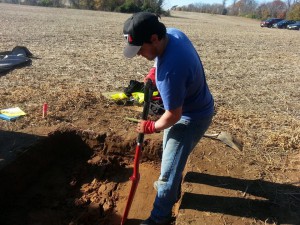To wrap up the 2014-2015 Whispering Woods field season, we’re posting some of the experiential essays written by our students. These essays were part of their end-of-semester final reports. In addition to reporting the semester’s finds, analysis, and recommendations, for future work, students were asked to end with a 1-pg essay on what the class meant to them and to provide the instructors with constructive feedback. This essay is from Arthur Murphy, a history major:

“Over the past year it has been my immense pleasure to work on this project. Every week was filled with a chance to get out of the classroom and explore the living world of history that exists all around us. The thing I loved the most about all of this was the prospect of uncovering something which hadn’t seen the light of day in centuries. The feeling of uncovering these artifacts and discovering something new is what kept bringing me back week after week. Rather than just look at photographs or read journal articles about historic places I got to discover a new historic property first hand. Whether that discovery came in the form of doing research for the research paper we wrote in the fall semester, or uncovering a new artifact in the field it felt good to be a part of discovering the history which you can find in your own backyard. Before I took this class I never thought I would be excited by the prospect of sifting dirt through a screen and finding tiny fragments of pottery, or old nails, or musket balls. Now every time I have the opportunity I cannot wait to get my hands dirty and find these little artifacts. I see now that every little detail has a story to tell about how it got there and what it was. I have found that these little details, these little pieces, can help us toward a broad understanding of the environment, and the world, around it.
I hope that in the future more classes like this can be offered to the students of Rutgers, or for that matter, any student from this part of the country. As a history major my classroom studies have taught me the value of written history. This value does not escape and I see how much ideas matter, and how much the past truly impacts the way we live today. What written history cannot do however is convey to people who aren’t interested in history that history still exists all around them and affects them every day. If more people took this course they would see just how much of the past is still alive today. They would see it when they hold a fragment of a plate made a century and a half ago, when they hold a musket ball potentially fired by a hunter, and when they hold a nail that used to hold a house together. Seeing that the objects which people made hundreds of years ago can survive into the present, perhaps they would also get an understanding that the ideas, beliefs, and actions of those in the past also live into the present as well. Thanks for everything, and hopefully I will see you during the field school.”
